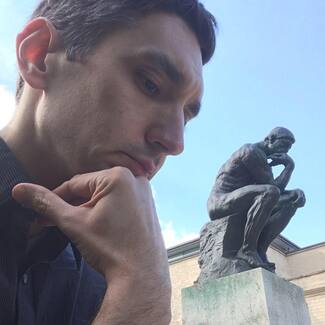Area of SpecializationHistorical: Abrahamic Medieval Philosophy
- emphasis on Arabic and Latin traditions Systematic: Metaphysics and Epistemology CV |
Area of Competency
|
Publications"When to Trust Authoritative Testimony: Generation and Transmission of Knowledge in Saadya Gaon, al-Ghazali, and Thomas Aquinas." ProQuest Dissertations and Theses (Ph.D., United States -- Wisconsin, Marquette University; Belgium -- KULeuven, 2021).
Link to dissertation | Additional details “Trust and Perspectivalism in the History of Epistemology: Testimony and After Certainty”. Rivista Di Folosofia Neo-Scolastica. May 2020. Link to article. “Biblical Inspiration & Islamic ‘Instrumental Causality’: Aquinas on the two authors of Sacred Scripture.” Muslim World. July 2019. Link to article Review of Causality and Resemblance: Medieval Approaches to the Explanation of Nature, by Maria-Jesús Soto-Bruna (ed.). Hildesheim, Zürich, New York: Georg Olms Verlag, 2018. Mediterranea, Spring 2019. Link to article |
Presentations"Be Wary of Contemporary Testimonial Theories applied to Pre-Enlightenment Thinkers", Society for Medieval and Renaissance Philosophy Inaugural Conference, University of Notre Dame, South Bend, USA – Rescheduled to October 2021
“Medieval and Renaissance Testimony on When to Trust Authority,” Philosophy in the Abrahamic Traditions: Structures of Being, World and Mind at The Institute of Ismaeli Studies, London, England – May 2021 “Al-Ghazali's Theory of Testimony,” 56th International Congress on Medieval Studies, Western Michigan University Medieval Institute, Kalamazoo, USA – May 2021 "To 'Like' a Racist Comment is to Say a Racist Comment: Social Media and Appropriated Discourse", Philosophy Department Weekly Series, Marquette University, Milwaukee, USA – February 2021 “Instrumental Causality and the Metaphysics of Primary and Secondary Causality,” 12th Annual Philosophy in the Abrahamic Traditions - Neoplatonism & Aristotelianism in Early Arabic Philosophy, Marquette University, Milwaukee, USA - June 2019 “Saadya Gaon’s Metaphysics of Revelation,” 7th Annual Symposium on Medieval & Renaissance Studies, St. Louis University, St. Louis, USA - June 2019 “Revealed Testimony in Abrahamic Faiths,” 2019 AAIWG International Meeting: Philosophy in the Abrahamic Traditions: Intellect, Experience and More, University of Pisa, Pisa, Italy - May 2019 “Trust and Perspectivalism in the History of Epistemology: Testimony and After Certainty” De Wulf – Mansion Centre for Ancient, Medieval, and Renaissance Philosophy - Philosophical Review Club, KU Leuven, Leuven, Belgium - May 2019 “Revelation & Testimony in al-Ghazali,” 9th Annual Graduate Student Conference 2018-2019, KU Leuven, Belgium - April 2019. “ ‘Epistemological wall’ as selection criterion: An Alternative Abrahamic trio to Averroes, Maimonides, and Aquinas,” Cordoba Near Eastern Research Unit (CNERU), Universidad de Cordoba, Cordoba, Spain - January 2019 “The Role of Testimony in Moses Maimonides’s Critique of Saadya Gaon,” Fall 2018 Annual Fall Workshop of Aquinas and the Arabs, Universidad Panamericana, Mexico City, Mexico - August 2018 “A Testimonial Defense of Saadya Gaon’s “Tradition” to Maimonides’s Guide of the Perplexed,” 11th Annual Philosophy in the Abrahamic Traditions - Rabbi Moses Maimonides, University of Denver, Denver, USA - June 2018 “Biblical Inspiration & Islamic “Instrumental Causality: Aquinas on the two authors of Sacred Scripture”, 53rd International Congress on Medieval studies, Western Michigan University Medieval Institute, Kalamazoo, USA - May 2018 “Aquinas on Biblical Inspiration: God Moving the Human Will via Instrumental Causality”, International Congress: Intelligence and Will in Thomas Aquinas, University of Navarra, Navarra, Spain - April 2018 “Biblical Inspiration & Islamic “Instrumental Causality: Aquinas on the two authors of Sacred Scripture”, The Aquinas and ‘the Arabs’ Graduate Student Workshop, Marquette University, Milwaukee, USA - March 2018. “al-Ghazali, the Anachronistic Analytic Philosopher of Religion”, 52nd International Congress on Medieval studies, Western Michigan University Medieval Institute, Kalamazoo, USA - May 2017 A response to Celia Byrne’s “Rethinking the Relationship between Essence and Existence in Ibn Sina’s Metaphysics”, Marquette Graduate Philosophy Conference 2017: Forgotten Philosophers (and why we should remember them), Marquette University, Milwaukee, USA - April 2017 “What does Baghdad have to do with Paris?”, Christian-Muslim Relations in America Today: An Interdisciplinary Symposium, Mellon Grant and Simmons Religious Commitment Fund, Marquette University, Milwaukee, USA - March 2017. “Al-Ghazali the Anachronistic Philosopher”, Fall 2016 North American Workshop on Aquinas and ‘the Arabs’, Marquette University, Milwaukee, USA - September 2016. “Al-Ghazālī the Anachronistic Philosopher: Medieval Analytic Philosophy of Religion Introduction”, The Aquinas and ‘the Arabs’ Graduate Student Workshop, Marquette University, Milwaukee, USA - February 2016. “Why We Should Use Dialogue Today: A Dialogue on Dialogue”, Marquette Philosophy Department Brown Bag, Marquette University, Milwaukee, USA - September 2015. “Social Epistemology & Communities of Faith: Is Aquinas’s Epistemic Division of Labor ‘Elitist Fideism’?,” The Aquinas and ‘the Arabs’ Graduate Student Workshop, Marquette University, Milwaukee, USA - February 2015. |

